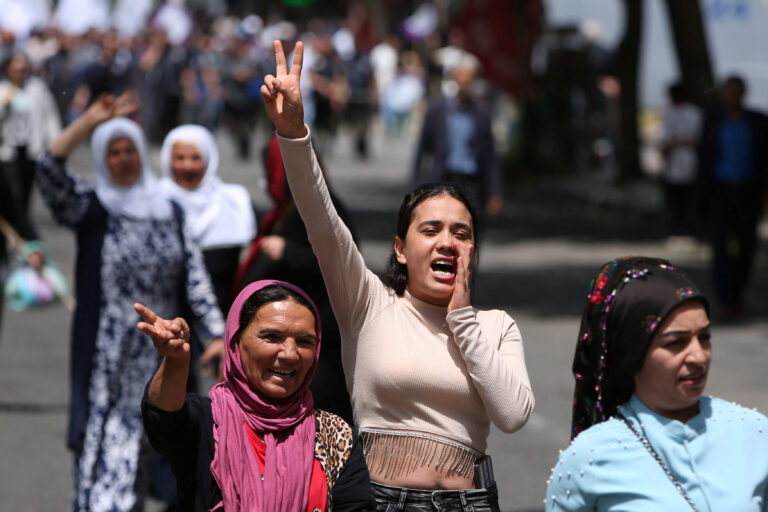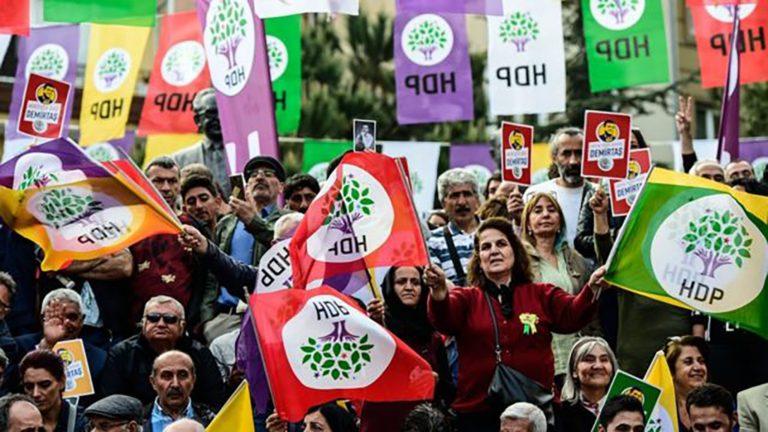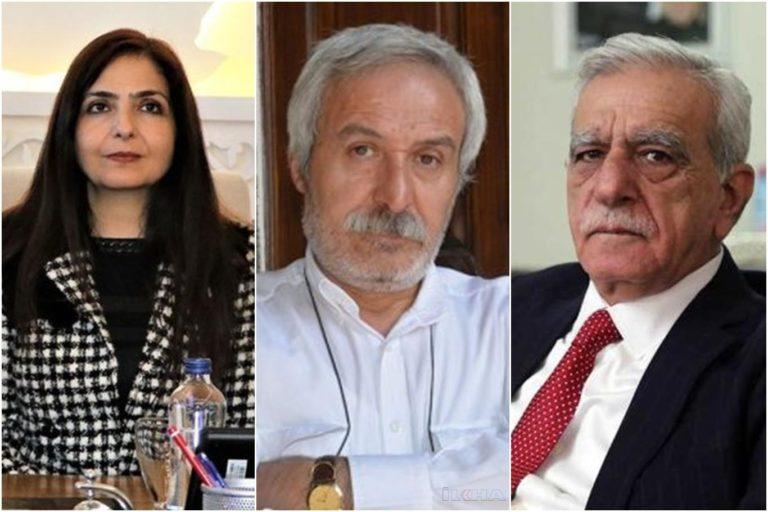Translated by Melissa Clissold
Ankara wants to show Operation Peace Spring as a “struggle against terrorism”, however; it is finding it extremely difficult to convince the international public. In fact, due to the operation, the complete opposite has happened; the Kurdish problem has now taken its place among the world agenda. What can be the results of this?
Hello, good day. I am taking into hand a topic that I mentioned towards the end of Tuesday’s broadcast. Yesterday during Transatlantic, during its last episode, whilst speaking to Ömer and Gönül we touched on this issue; this “Internationalisation of the Kurdish issue”, I believe is the most striking consequence of Operation Peace Spring– and the most lasting one I think. Turkey, Iraq, Iran and Syria all had different Kurdish problems, they still do. And at the same time the Kurdish problem was a regional problem.
And now together with this, together with this recent operation, together with the impact that the operation has had, especially in the Western part of the international public – but we can actually say the entire international public – the Kurdish issue has been made a part of everyone’s agenda. A completely different thing was aimed at here, Turkey, with the claim of protecting its southern border and wanting to send back certain refugees to Syria, undertook this operation; but one of the first consequences for this movement is that the Kurdish issue has now gained more sympathy across the globe. This of course is not something that happened suddenly.
There is a before. Before, the People’s Protection Units (YPG) and Democratic Union Party (PYD) – they are both the same thing, one is the political wing, the other is the military wing – and the transformed version of them, the Syrian Democratic Forces (SDF), has been fighting together with the West, the US and with the coalition it has formed against ISIS for a long time, the organisation that the West is most afraid of. Of course, the air support and logistic support of the US foremost was very important in terms of the YPG or SDG’s successes against ISIS.
But essentially, the people in the SDG or YPG were basically used in the fight against ISIS. And it is said that that they have lost hundreds, in fact thousands of people. And within this process, the YPG, SDG, PYG – whatever you want to call it – came to be known by the Western public. If a film was being made in Syria, ISIS was the bad guy and YPG was the good guy. The women especially of this organisation, the women militants drew a lot of attention. On one hand women amongst ISIS were being treated as second class, being insulted, closed-off, covered-up; on the other hand, women fighters, militants that looked free and able to talk…
In fact, certain prominent Western women’s magazines sent their photo journalists to these regions and published photographs – it even went all the way to fashion magazines. In such an environment, where the administration of Turkey has also been blamed for supporting or turning a blind eye towards jihadi groups, this operation taking place against this group (the YPG), was already something hard to create a positive image in the media to begin with. And in a short time, it was seen that it was nearly impossible.
Meaning, perhaps they would win in an operational manner, but when looked at generally, from a right and wrong perspective, the Western public mostly sees Ankara, Turkey, or the Turkish Armed Forces (TSK) and the powers they support as the wrong-doers. And it shows the other side as right. Turkey has attempted to change this perspective; but it doesn’t look possible, it doesn’t look like it will be successful.
When we look at it, all these movements – whether the PYD or the YPG, or the Kurdistan Workers’ Party (PKK) – it was not actually possible for them to make their own issue so accepted across the global public. Neither their means, or their ways of management, or their language would have been sufficient for this. They wouldn’t have been able to do this; but with this operation, the foundation that was being prepared for a while, was mostly completed in this process and as a result of this, a regional problem, the Kurdish problem present in certain countries has now been taken to the international arena. And generally, people under the influence of the media are choosing the side of the Kurds as opposed to Turkey.
Of course, we are faced with a problem here: “We are not against Kurds, we are against terrorists, we are against the YPG.” This is the official expression. President Erdoğan and other government spokespeople, spokespeople of the administration are stating this. But it is not possible to say that this corresponds to anything. When we look at it, do a quick search or a detailed search, it is not possible to find this. This is not only relevant when it comes to the media. This is the same when it comes to countries too. And the latest example of this is Trump’s letter that shocked Turkey – I mean, the word shock has been used quite a lot and lost a bit of its meaning, but let’s say shock.
Medyascope'un haftalık e-bülteni
Andaç'a abone olun
Editörlerimizin derlediği öngörüler, analizler, Türkiye’yi ve dünyayı şekillendiren haberler, Medyascope’un e-bülteni Andaç‘la her çarşamba mail kutunuzda.
In fact, what Trump has said in this letter had been reflected bit by bit. Sometimes with his tweets, sometimes with Senator Graham’s explanations. There for example, what does Trump say? “I spoke with General Mazloum, he is ready to compromise, I attach his letter, you should take this into account; if not this will happen…” The person General Mazloum that he talks about, is a YPG commander called Mazloum Kobani. And he doesn’t hide it himself, he is in the same line of Öcalan, we know this. And this person is someone that Trump has direct communication with, someone that he speaks to directly. From what I understand he did not speak to him through mediators but directly.
Not only does he speak with himself, he tells Erdoğan “Talk among yourselves, sort your problems between yourselves.” President Erdoğan already had said, “There are many people trying to mediate between us, if they really want to, they should convince them.” But we see here that these people here are not terrorists, even if they are, they are people who can speak. They speak themselves, and they are inviting Turkey to speak. Another aspect, is that Russia is at the other end of this. Russia already does not see the PKK as a terrorist organisation. They have agencies in Russia. And we can see here that the Moscow administration has urged Damascus to collaborate with the YPG. And this impacted Operation Peace Spring from its roots.
We know that the YPG has handed over many important places to the Syrian military. And this has seriously changed the flow of this operation and will continue to do so. We can see here that the Syrian administration and Moscow are not treating these people as terrorists. They see these people and groups as those who they can talk with, negotiate with. In the meeting that President Erdoğan will have with Putin next week – and they see each other often – this will be the first of two points.
The first, as I understand is that there will be a request for Ankara to meet with Damascus and directly resolve some issues. Another will be to force some sort of agreement between Ankara and YPG/PYD either through Syria or Moscow. Therefore, we can see that certain big powers are not seeing these structures as terrorists and want some of their demands to be met. Turkey’s approach until now has been, “We will not negotiate with terrorists.”
Yet, we know that this isn’t the case from examples in the past such as meetings that were had with the PKK representatives during the Oslo process, and later on the ‘solution process’, ‘peace process’ or meetings had with Öcalan or with Quandil through representatives of the People’s Democratic Party (HDP) that the government was also aware of. Therefore, through the step that Turkey has taken right now, Turkey has carried the Kurdish problem to the international arena. And I do not think it is as strong as it was before. How strong was it before? That’s another discussion for debate. But it is certain that it is in a more weakened position right now.
The solution processes, which all had different names, the fractions that the state communicated with – whether HDP, directly or indirectly Öcalan, or Quandil – they had always requested international observers to be present – this will be remembered. Those in Turkey’s administration however stated they did not need this, they said that Turkey could resolve this itself. Whilst one side constantly tried to take this to the international platform, Turkey, Ankara, tried to resolve this within a national platform. But it did not succeed, it didn’t work. Why not? That is another discussion, but it didn’t work.
Right now, Turkey and Erdoğan, for a very long time have made it clear that they do not want to take steps regarding the Kurdish problem. He has stated “It’s already resolved, there is no such problem” for such a long time – but this operation has carried this issue to the international arena and something had started; Trump has said constantly, has tweeted – he does not see this as a struggle against terrorism but he says: Turks and Kurds have been fighting for years. I am trying to make them up.”
In his latest statement he said “PKK is more dangerous than ISIS, they are worst”, but we can see that he is always explaining this tension as a Turkish-Kurdish tension. Many Westerners agree with this. Therefore, the perspective that Turkey is trying to present regarding fighting terrorists is not shared, the Kurdish problem perspective is seen and therefore this will be on the agenda in the near future a lot and even if Turkey does not want to approach this, we must see that foreign countries, politicians and organisations will try to bring this to the current agenda in the foreseeable future.
Of course, there is a resistance here. There is a resistance that has been formed during the latest period of People’s Alliance. And there is large support for Operation Peace Spring outside of the People’s Alliance too. Due to this support, it is not possible to say that international pressure will bring about many results. But after a certain time, I believe that this will come to the agenda quite seriously. There are no more steps for Turkey to ignore the Kurds, to put the Kurds to the background, or even choose to lose the Kurds. This needs to be compensated for.
But when you say this you immediately get a “What is the Kurdish problem? Explain this to me, Kurds get everything they want” response from politicians or people in denial. This is not the case; Turkey, and in fact the entire region has a very serious Kurdish problem. And the West and international arena and public is very interested and knowledgeable about this topic. And even if this operation did not start this, it allowed it to grow. I do not want to say much about the latter.
Because generally the letter is being seen as how bad Trump is… “He’s already like this, Trump is like this anyway”, but as a journalist who worked two and a half years in Washington I can see how much of a disaster this is. When I worked, for example between 2004-2005, a simple word in such a letter would have caused havoc. Now Turkey is trying to evade this by somewhat saying “Whatever Trump does is valid.” But this is not something to be accepted. I must also say that with such a nationalistic outlook, the fact that this letter has not been made into a big deal, is something to be noticed. Yes, this is all I have to say. Good day.














